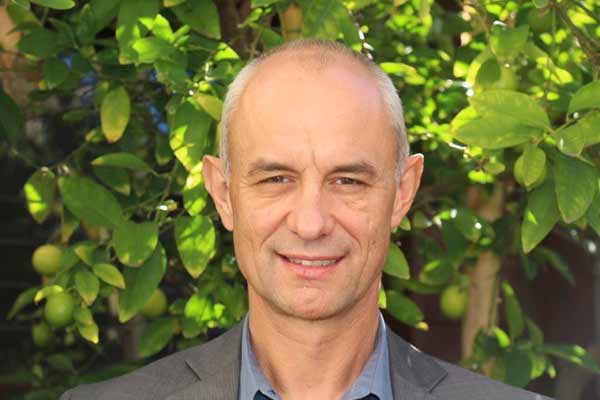
UC San Diego History Professor Earns Prestigious NEH Fellowship
Frank Biess receives funding from the National Endowment for the Humanities as part of its $16.3 million granted to 290 projects in 43 states, the District of Columbia and Puerto Rico
Published Date
By:
- Cynthia Dillon
Share This:
Article Content

UC San Diego history professor and NEH fellow Frank Biess. Photo courtesy of Frank Biess
University of California San Diego history professor Frank Biess is interested in emotions. More specifically, he plans to examine the role of fear and anxiety within the historical context of postwar West Germany. The NEH Fellowship for University Professors enables Biess to address questions about how feelings are produced politically, how they impact society and how they change over time—demonstrating the valuable insight humanities scholars can gain when they engage with the expanding interdisciplinary research on emotions.
The NEH award for Biess, a historian with a focus on 20th-century Germany, comes on the heels of major humanities funding by the Andrew W. Mellon Foundation for the UC San Diego Division of Arts and Humanities. In October, the division received a $2.59 million Mellon grant in support of a comprehensive project it created in partnership with the San Diego Community College District. The joint project eases the transfer and transition of humanities students from community college to the highly ranked, four-year research university.
“In the humanities at UC San Diego, we continue to build our distinction around a cadre of interdisciplinary scholars whose expertise demonstrates global reach, combining meticulous research with paradigm-changing interpretation,” said Cristina Della Coletta, dean of the division. “Professor Biess’ NEH Fellowship is a powerful example of our faculty’s excellence.”
The outcome of Biess’ project will be a book that aims to provide a new history of the Federal Republic of Germany. The book will be published by Oxford University Press in a new series on the history of emotions edited by Ute Frevert and Thomas Dixon. It will be accessible to undergraduate and graduate students and to specialists in modern German and European history and the history of emotions. Biess is also planning to write a popularized German version of the book, which is under contract with Rowohlt Verlag, a German trade publisher.
“While the history of postwar West Germany is often told in a celebratory mode that highlights the progressive liberalization or westernization of the Federal Republic, the same history also featured intense cycles of fear and anxiety—the proverbial ‘German angst’—that permeated West German society throughout the postwar period,” Biess said. He explained how memories of the country’s catastrophic past that entailed fascism, war and genocide shaped postwar German anticipations of their future in multiple ways.
“My project asks how this distinctly German form of fear and anxiety was related to, complicated and sometimes facilitated the process of democratization,” referring not only to the establishment of democratic institutions but also to the emergence of an emotional investment in democratic processes. “While I do not question the relative success of the Federal Republic, my project seeks to make central the considerable uncertainty, fear and even panic that shaped postwar Germans’ historical experience.”
The book examines three different levels of the history of fear and anxiety: analysis of changing normative frameworks or “emotional regimes,” articulations of broad individual and collective political fears, and investigations of the social and political functions of fear and anxiety. Biess said it will feature seven carefully constructed and archival-based case studies covering the period from the 1940s to the 1980s, as well as an epilogue on the post-unification period after 1989. Each of the case studies draws on specific historiographical strands such as the legacies of defeat and occupation, the Cold War, economics and the protest movements.
“The study’s broad temporal frame allows me to document the shifting objects of fear and anxiety, and it enables me to trace the changing cultural norms governing the expressions of fear and anxiety in public, as well as the varying social and political functions that these emotions served,” Biess said.
The Department of History is one of six departments within the #23 nationally ranked UC San Diego Division of Arts and Humanities, according to U.S. News and World Report’s recent Best Global Universities listing.
Share This:
You May Also Like
Stay in the Know
Keep up with all the latest from UC San Diego. Subscribe to the newsletter today.


